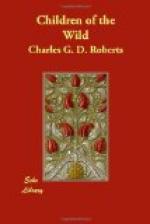Before consenting to the Child’s initiation, Uncle Andy had impressed upon him with the greatest care the enormity of breaking the spell of stillness by even the slightest and most innocent-seeming movement.
“You see,” had said Uncle Andy, “it’s this way! When we get to the place where we are going to hide and watch, you may think that we’re quite alone. But not so. From almost every bush, from surely every thicket, there’ll be at least one pair of bright eyes staring at us—maybe several pairs. They’ll be wondering what we’ve come for; they’ll be disliking us for being so clumsy and making such a racket, and they’ll be keeping just as still as so many stones in the hope that we won’t see them—except, of course, certain of the birds, which fly in the open and are used to being seen, and don’t care a hang for us because they think us such poor creatures in not being able to fly—”
At this point the Child had interrupted:
“Wouldn’t they be surprised,” he murmured, “if we did?”
“I expect they’ve got some surprises coming to them that way one of these days!” agreed Uncle Andy. “But, as I was saying, we’ll be well watched ourselves for a while. But it’s a curious thing about the wild creatures, or at least about a great many of them, that for all their keenness their eyes don’t seem to distinguish things as sharply as we do. The very slightest movement they detect, sometimes at an astonishing distance. But when a person is perfectly motionless for a long time, they seem to confuse him with the stumps and stones and bushes in a most amazing fashion. Perhaps it is that the eyes of some of them have not as high a power of differentiation as ours. Perhaps it is that when a fellow is a long time still they think he’s dead. We’ll have to let the scientists work that out for us. But if you go on the way you’re beginning (and I’m bound to say you’re doing very well indeed, considering that you’re not very big), you’ll often have occasion to observe that some of the wild creatures, otherwise no fools, are more afraid of a bit of colored rag fluttering in the wind than of an able-bodied man who sits staring right at them, if only he doesn’t stir a finger. But only let him wiggle that finger, his very littlest one, and off they’ll be.”
The Child put his hand behind his back and wiggled his little finger gently, smiling to think what sharp eyes it would take to see that motion. But his Uncle, as if divining his thoughts, went on to say:




